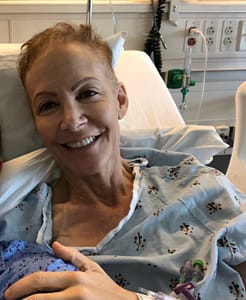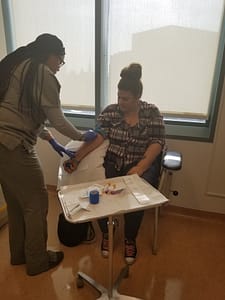
Lynda Brooks-Bracey
A dying Las Vegas mom, advocates with incurable cancer, physicians and families of loved ones who suffered before their deaths are hopeful lawmakers will pass a bill that would allow terminally ill adults the option of medical aid in dying to peacefully end unbearable suffering. The End of Life Options Act (SB 239), sponsored by Sen. Edgar Flores (D-Las Vegas) and 18 other sponsors, was heard by the Assembly Health and Human Services Committee on Wednesday (the hearing has not ended yet). The committee will vote in the coming weeks on whether to advance the bill to the Assembly floor. The Senate approved the bill last week.
Passing the bill would fulfill one of the last wishes for Lynda Brooks-Bracey, a 57-year-old Las Vegas mother of four dying of metastatic pancreatic cancer. Lynda is using her final days or weeks to advocate for lawmakers to pass the bill that would allow terminally ill Nevada adults with six months or less to live the option to request and receive a prescription for medication that they could decide to take to end unbearable suffering and die peacefully.
As a result of her declining health, Lynda was unable to testify today as she did in March at a hearing before the Nevada Senate Health and Human Services Committee. On Tuesday, Lynda asked Dan Diaz, the husband of the late medical aid-in-dying advocate Brittany Maynard, to testify on her behalf.
“Metastatic pancreatic cancer is killing me, and it will end my life,” testified Diaz on Lynda’s behalf. “It’s unfair to FORCE my family to watch me die in the kind of pain pancreatic cancer so often causes, especially when there is a safe option like medical aid in dying that so many other states offer their terminally ill individuals.”
“Please support SB239,” testified Diaz on Lynda’s behalf. “It would give dying Nevadans like myself the option to die peacefully, surrounded by those they love.”
Johanna Koch, MD, a palliative care/primary care provider practicing in Reno, spoke about her experience with prescribing the aid-in-dying medication in California.
“When a terminally ill patient peacefully ends their suffering by taking aid-in-dying medication, the cause of death is listed as the underlying disease and is coded as natural, just as it is if they had discontinued dialysis treatment or a doctor removed the patient’s breathing tube before they died,” she said. “In accordance with the best practices from the Centers for Disease Control and Prevention, it is important to identify the underlying disease because it helps policymakers prioritize research funding to prevent illness.”
The passing of the bill is very important for Hanna Olivas, a 49-year-old Las Vegas mother and grandmother living with a rare form of incurable blood cancer, multiple myeloma.

Hanna Olivas
Hanna was scheduled to testify in Las Vegas on Wednesday, but she was forced to cancel because of her deteriorating health. She asked her friend, Patricia A. González-Portillo, to testify on her behalf.
“God has given me one more opportunity to use my voice,” testified González-Portillo on Hanna’s behalf. “I am not the same Hanna that I was in 2021 when I advocated for this measure. I do not have much time. My focus is to live my last days surrounded by my children and two grandchildren. I don’t have the energy or time to fight for this bill any longer.”
A new poll conducted this month shows 82% of Nevadans support medical aid-in-dying legislation, a jump of 10 points from the 72% from a 2021 poll.
Nearly four out of five voters with disabilities (79%), Republicans (78%), Democrats (76%), Catholics (77%) and Protestants (80%) said they personally wanted the option of medical aid in dying if they had an incurable, terminal illness, according to the new survey of 600 registered Nevada voters. The survey was conducted April 10-13 by Susquehanna Polling & Research and sponsored by Compassion & Choices Action Network.
Eleven jurisdictions have authorized medical aid in dying, including 10 states, California, Colorado, Hawaii, Maine, Montana, New Mexico, New Jersey, Oregon, Vermont, and Washington, as well as Washington, D.C. Collectively, these 11 jurisdictions represent one out of five U.S. residents (22%) and have decades of combined experience successfully implementing this medical practice, starting with Oregon in 1997.
Compassion & Choices is comprised of two organizations that improve care and expand options at life’s end: Compassion & Choices (501(c)(3)) educates, empowers, defends and advocates; the Compassion & Choices Action Network (501(c)(4)) focuses exclusively on legislation, ballot campaigns and limited electoral work.
Paid for by Compassion & Choices Action Network.
Compassion & Choices
Media Contacts
David Blank
Media Relations Director
[email protected]
Phone: (227) 225 6553
Patricia A. González-Portillo
Senior National Latino Media Director
[email protected]
(323) 819 0310
Mail contributions directly to:
Compassion & Choices Gift Processing Center
PO Box 485
Etna, NH 03750